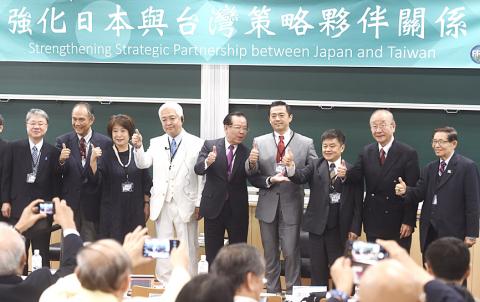Japan should enforce a law parallel to the US’ Taiwan Relations Act (TRA) to consolidate its partnership with Taiwan, Jikido Aeba, a Japanese lawmaker and academic, told a seminar in Taipei yesterday.
He is also concerned about Taiwan’s security in the face of mounting Chinese pressure, Aeba told a seminar titled Strengthening Strategic Partnership between Japan and Taiwan, which was organized by the Formosa Republican Association and the Japanese Conservative Union (JCU) at National Taiwan University.
Taiwan’s future is at stake in its presidential and legislative elections on Jan. 11, while it is expected to face more pressure from China after the elections, said Aeba, who is chairman of the JCU.

Photo: Chien Jung-fong, Taipei Times
While many Japanese hope support for Taiwan can be bolstered, the past 70 years has seen mostly economic collaboration, he said.
Democratic partners, such as Japan, the US, India, Australia and South Korea, should support Taiwan, while Tokyo should announce that it would guard Taiwan if it faces security threats, he said.
The Japanese government should establish a Taiwan-Japan relations bill, while amending its constitution to enable the Japan Self-Defense Forces to defend its Asian partners, he said.
It is important for Japan that Taiwan maintains its democracy and freedoms, said Genki Fujii, a Japanese academic of international affairs.
If Taiwan were annexed by China, Japan’s security, economy and social prosperity would be affected as well, Fujii said, adding that the destinies of Taiwan and Japan are closely tied.
Taiwan has followed Japan in its economic development and grown into a democracy, and its political and economic achievements are remarkable in Asia, he said.
By contrast, China falsely claims to have a capitalist system, but it steals ideas from other countries, he said.
He asked how China could lead a nation as advanced as Taiwan.
As an outsider, Taiwan is a great country, Fujii said, calling on Taiwanese to be more confident.
Taiwan-Japan ties should be consolidated through legislation, he said, adding that the Japanese government should enforce a parallel version of the TRA.
While the issue is not yet on the Japanese government’s agenda, some lawmakers have expressed an interest in it, he said, adding that the JCU would continue lobbying for the issue, even though it might take some time.
Steve Bannon, a former White House strategist for US President Donald Trump, gave a recorded speech at the seminar.
Taiwan’s elections next month are about defending independence and freedom, which is far more important for the region and the entire world, especially as the Chinese Communist Party continues to enslave its people and threaten regional order, Bannon said.

‘ABUSE OF POWER’: Lee Chun-yi allegedly used a Control Yuan vehicle to transport his dog to a pet grooming salon and take his wife to restaurants, media reports said Control Yuan Secretary-General Lee Chun-yi (李俊俋) resigned on Sunday night, admitting that he had misused a government vehicle, as reported by the media. Control Yuan Vice President Lee Hung-chun (李鴻鈞) yesterday apologized to the public over the issue. The watchdog body would follow up on similar accusations made by the Chinese Nationalist Party (KMT) and would investigate the alleged misuse of government vehicles by three other Control Yuan members: Su Li-chiung (蘇麗瓊), Lin Yu-jung (林郁容) and Wang Jung-chang (王榮璋), Lee Hung-chun said. Lee Chun-yi in a statement apologized for using a Control Yuan vehicle to transport his dog to a

Taiwan yesterday denied Chinese allegations that its military was behind a cyberattack on a technology company in Guangzhou, after city authorities issued warrants for 20 suspects. The Guangzhou Municipal Public Security Bureau earlier yesterday issued warrants for 20 people it identified as members of the Information, Communications and Electronic Force Command (ICEFCOM). The bureau alleged they were behind a May 20 cyberattack targeting the backend system of a self-service facility at the company. “ICEFCOM, under Taiwan’s ruling Democratic Progressive Party, directed the illegal attack,” the warrant says. The bureau placed a bounty of 10,000 yuan (US$1,392) on each of the 20 people named in

The High Court yesterday found a New Taipei City woman guilty of charges related to helping Beijing secure surrender agreements from military service members. Lee Huei-hsin (李慧馨) was sentenced to six years and eight months in prison for breaching the National Security Act (國家安全法), making illegal compacts with government employees and bribery, the court said. The verdict is final. Lee, the manager of a temple in the city’s Lujhou District (蘆洲), was accused of arranging for eight service members to make surrender pledges to the Chinese People’s Liberation Army in exchange for money, the court said. The pledges, which required them to provide identification

INDO-PACIFIC REGION: Royal Navy ships exercise the right of freedom of navigation, including in the Taiwan Strait and South China Sea, the UK’s Tony Radakin told a summit Freedom of navigation in the Indo-Pacific region is as important as it is in the English Channel, British Chief of the Defence Staff Admiral Tony Radakin said at a summit in Singapore on Saturday. The remark came as the British Royal Navy’s flagship aircraft carrier, the HMS Prince of Wales, is on an eight-month deployment to the Indo-Pacific region as head of an international carrier strike group. “Upholding the UN Convention on the Law of the Sea, and with it, the principles of the freedom of navigation, in this part of the world matters to us just as it matters in the